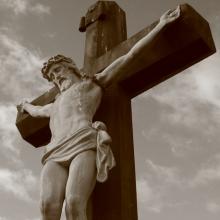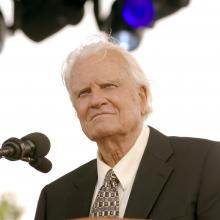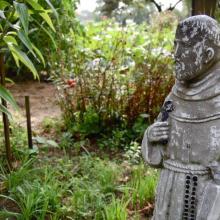Sin
It’s one of the deepest and most enduring themes of the Bible; from Cain and Abel, Isaac and Ishmael, Esau and Jacob, and many more — the two sons, with jealousy, strife, and even murder between them, and almost always, the younger brother takes the glory – or the blame – for the acts of the older brother.
We see it again in the Boston Marathon bombings – the elder brother portrayed as cynical and brutish, while the younger brother, taking the blame, is shown as charming and innocent.
IN AMERICA, WE honor the ideal of equality and the myth of equal opportunity—but the secret we refuse to acknowledge is the debilitating, dehumanizing effects of poverty. As a pastor serving the South Side of Chicago, I witness firsthand the pain that poverty inflicts upon our congregation and the scars it leaves on the most vulnerable: children. Faith in Christ should mean a commitment to the poor.
There is a growing wealth gap between African-American households and white households. A Pew research study, for example, shows the dramatic change between 2005 and 2009. In 2005, the typical white household had a net worth of $134,992 (in 2009 dollars), while the typical black household had a net worth of $12,124—9 cents for each dollar the white household owned. By 2009, that fell to 5 cents, as the typical black household saw its net worth drop more than 53 percent, as compared to a drop of 16 percent for the average white household. And, alarmingly, 35 percent of black households in 2009 had a zero or negative net worth.
A few seek to blame this damaging downward trend on the current administration's policies. This is unfair and incorrect. Black families have traditionally built wealth through homeownership, but since the mid-1990s we have witnessed a dramatic increase in bank mergers—and predatory lending. Local banks, now owned by large corporate institutions with little interest in community investment, increasingly close branches in poor communities, then check-cashing establishments fill the void in financial services. At the same time, our nation faces the loss of manufacturing and the dismantling of organized labor. The triple threat of regressive economic policy, unchecked expansion of large, unaccountable financial institutions, and the economic crisis of 2008 devastated parts of cities across the nation: Chicago, Cleveland, Detroit, Atlanta, New York, Buffalo, Flint, and many others.
(The Controversial figure Rob Bell has created another firestorm with his latest provocative book What We Talk About When We Talk About God. Raven Foundation Education Director, Adam Ericksen and Tripp Hudgins will share our thoughts on the book in this blogalogue. We invite you to join the discussion by leaving a comment below.)
Tripp Hudgins always gets me thinking. He is right that Rob’s chapter “Open” in What We Talk About When We Talk About God is about science and religion but that it’s also not about science and religion. This is the longest chapter of the book, and it’s full of scientific information that points to the mystery of the material world. What’s the point? As Tripp states, Rob is “asking for a little humility. He’s asking for a little poetic imagination. He’s asking for curiosity.”
That’s the point of the next chapter, too. Titled “Both,” in this chapter Rob points out a major problem we have with “God-talk.” That problem is language. Tripp set me up for this at the end of his post by asking, “Are words actually enough? Ha! Write about that. Words. Words. Words.”
When I was in seminary I learned about apophatic theology, or negative theology. It tries to define God by what God is not. A 9th century apophatic theologian named John Scottus Eriugena asserted, “We do not know what God is. God Himself does not know what He is because He is not anything. Literally, God is not because He transcends being.”
The first Christians confessed that Jesus is "God from God, light from light, true God from true God." Jesus is, they finally confessed after centuries of dispute, who the Gospels and the apostles plainly tell us: God without qualification. Bethlehem's baby boy grew to be the man from Nazareth, who is also from before time and forever the only begotten Son.
Jesus tells Philip that he and the Father are one; that if Philip has seen Jesus, then Philip has seen the Father. Paul tells the Colossians that Christ is the visible image of the unseen God. The Hebrews are taught by their apostle that Jesus bears the very stamp of God's nature.
If anything we think we knew about God before Jesus arrives in Mary's womb contradicts what we see and hear of Jesus in the Gospels, then we are the ones who are mistaken, the ones who weren't paying close enough attention before he came (yes, Jesus reveals the same relationship-initiating God of holy love we encounter in the pages of the Hebrew Bible); we are the ones who have, since his decades of extravagant humility among us as one of us, forgotten the Christ.
I try to be a diplomat, to err on the side of patience, when it comes to theological differences between Christians.
Reconciliation and peacemaking come natural. My wife says I stop sounding like myself when I'm hard-nosed or critical.
But recently, sitting across from a young man who heroin ("that boy") very nearly got the better of just days before, I lost at least a layer of my irenic self, lost a bit of my cool. When it comes to certain teachings, I'll not be as diplomatic in the future.
When are we going to stop teaching that the Father has to look on Jesus to love us? Why do we teach that the Father turns away from us, abandons us because of our sin? When are we going to stop teaching that the Father is angry with men and women or hates us (or stop projecting any other merely human emotion on to God?), conveying by our messages (verbal and nonverbal) that God despises that which he gloriously made in God's image?
The message we too often send is that Jesus must persuade the Father to love us, must plead with his Father not to forsake us.
At the center of Christianity is a weird claim: that we have been saved by sacrifice. And it was a gruesome sacrifice at that, a snapshot of humanity at our worst, for the Christian claim is that what saved us was the torture and putting to death on a cross of an innocent man falsely charged as a criminal. Weird doesn’t begin to describe the strangeness of this idea. The talented and thoughtful writer, Colm Toibin, has taken the church to task regarding this claim. As quoted by Maureen Dowd about his one-woman show opening soon on Broadway, The Testament of Mary, Toibin says this: “The idea that we were somehow saved and redeemed by a crucifixion seems strange to me. The idea of human sacrifice is something we really have to think about, even people who are practicing Catholics, the idea of taking a single individual for the sake of any cause.”
I have been thinking a lot about the idea of human sacrifice lately. In fact, I’ve been up to my eyeballs in it because I’ve been editing a new introduction to Christianity by the Catholic theologian James Alison. At the center of his course is an insight about how a death on a cross could have redeeming qualities. Here’s how Alison understands what happened at the cross: Jesus did not invent human sacrifice and going to his death on a cross was not an endorsement of the torture and murder of innocent victims. It was an exposé. What we have in the Gospel accounts of Jesus’ Passion is a fairly complete picture of how human beings, without any assistance from God, have saved our own necks by crucifying someone else. We commit sacrifice when we scapegoat, demonize, marginalize, expel, persecute or kill others in the name of our own safety and security or to bolster our belief in our own goodness. As the Gospels tell us rather directly, enemies become reconciled when they can find a common enemy to unite against: “That same day [the day of the crucifixion] Herod and Pilate became friends with each other; before this they had been enemies.” (Luke 23:12)
Deep with one savior’s death, how many more?
In observance of which, the Dresden burghers
as usual held Shrove Tuesday circuses
around Our Lady’s Church, the Frauenkirche,
eating pancakes before their fast for Easter.
EARLY IN J.R.R. Tolkien's The Fellowship of the Ring, Gandalf the wizard is talking with the hobbit Frodo Baggins about the dreadful Gollum. The frightened Frodo expresses his regret that his uncle Bilbo had not killed "that vile creature, when he had a chance!"
Because of "all those horrible deeds" that Gollum has done, Frodo adds, "He deserves death." Gandalf replies, "Deserves it! I daresay he does. Many that live deserve death. And some that die deserve life. Can you give it to them? Then do not be too eager to deal out death in judgment. For even the very wise cannot see all ends. I have not much hope that Gollum can be cured before he dies, but there is a chance of it."
I do not know where Tolkien stood on the issue of capital punishment, but Gandalf offers theologically relevant points about innocence, guilt, judgment, and hope that Christians should seriously consider as heated debate continues about the morality of this lethal governmental practice.
While a majority of Americans still view capital punishment as morally justified, there is growing opposition to it. Indeed, the number of death sentences dropped to a 35-year low in 2011, and the annual number of executions since 1999, the year in which the most persons were put to death, has with a few exceptions continued to decrease. Seventeen states have abolished capital punishment, including Connecticut, which outlawed the death penalty on April 25, 2012, for any future crimes committed. In 2012, 12 states had active legislation to end it. Why?
Much of the rethinking, even among "law-and-order" conservatives, centers on 1) mistakes that may lead to wrongful convictions and the executions of innocent persons, 2) unfairness in its application, especially in connection with racial and economic biases in society and in the criminal justice system, 3) data that call into question whether capital punishment is an effective deterrent to violent crime, and 4) the high costs for states (and therefore for taxpayers) to implement it (see box on facing page).
While the empirical studies and criminological research are very important, for Christians it is the theological and biblical framework that should ultimately determine our stance on this contentious issue.
The following is from a letter by Billy Graham posted recently on the Billy Graham Evangelistic Association website:
"Some years ago, my wife, Ruth, was reading the draft of a book I was writing. When she finished a section describing the terrible downward spiral of our nation’s moral standards and the idolatry of worshiping false gods such as technology and sex, she startled me by exclaiming, “If God doesn’t punish America, He’ll have to apologize to Sodom and Gomorrah.”
She was probably thinking of a passage in Ezekiel where God tells why He brought those cities to ruin. “Now this was the sin of … Sodom: She and her daughters were arrogant, overfed and unconcerned; they did not help the poor and needy. They were haughty and did detestable things before me. Therefore I did away with them as you have seen” (Ezekiel 16:49–50, NIV).
I wonder what Ruth would think of America if she were alive today. In the years since she made that remark, millions of babies have been aborted and our nation seems largely unconcerned. Self-centered indulgence, pride, and a lack of shame over sin are now emblems of the American lifestyle."
Yes, there are plenty of examples to support the case Graham is making, but is it fair or accurate to suggest that all points indicate a fundamental moral decay?
To begin, we might ask “What’s sin?” I’m aware that there are about a thousand disputed ways to answer that question–and so no one ‘perfect’ way–but I like this one:
Sin is the seeking of our own will instead of the will of God, thus distorting our relationship with God, with other people, and with all creation.
And I’d add that the people who make it easy for all of us to hate our bodies (through relentless idealization of unreal bodies, through profit-motivated manufactured discontent) are more ‘guilty’ than the teenager who thinks there’s something wrong with her thighs.
Then we might ask “what’s meant by ‘hating my body’?” There’s no answer in a catechism, of course, but we could try something like this:
Hating one’s body is the disrespecting of the body God has given us, which in itself is worthy of respect and honor, being made in God’s image, the fulfilling of desires in ways God not intend, to believe lies about human bodies in general and ours in particular, and to covet for ourselves a body not our own.
Yesterday, I was walking through Dolores Park and heard a street preacher, saying "If you've ever stolen a stick of gum, then you are guilty of sin! If you've ever looked at Facebook at work, then you've stolen from your employer, and that's sin!"
Of course we all know where he was headed: If we have sinned—even with a trivial infraction like a stick of gum—then God who is holy must punish us for all eternity in Hell unless we accept Jesus right now.
I mean, seriously, gum? Why can't God just get over it? Is God less moral than all of us are? This is not a picture of holiness, it is a picture of a petty tyrant. Aside from the horrible picture of God that this gives us (and honestly, who could ever love, trust, and feel safe around a God like that?), what this ultimately does is trivialize sin. It makes sin into a petty infraction of little consequence.
It amazes me how many Christians are willing to criticize those who have fallen. It seems that the Christian army are far too willing to shoot the wounded.
But shouldn’t we be the first ones to come alongside those who have fallen to show mercy, love, grace and compassion? Of all people in this world, shouldn’t Christians always root for restoration?
Central to the Christian faith is the claim that all men and women are sinful and broken, but through God’s mercy they are on the mend and experiencing new life. Those who follow Jesus claim God’s saving grace and forgiveness. Why is it then, so many seem unable or unwilling to give it?
A couple hours ago on Facebook, Catherine posted that she had just seen a snake on her hike. As her pastor I thought it best to reply, “If it starts talking, don’t listen”
This likely came to mind since I was editing this very sermon about Adam and Eve. The story of the Garden of Eden is what is called an origin story and every culture has theirs. Origin stories tell us how the world came about and where we came from and other important things like why snakes don’t have legs. We think we might know our origin story really well, but in the Genesis account of the Garden of Eden, there actually is no mention of sin, or a fall, or Satan, or temptation, and I hate to break it to you but there wasn’t even an apple involved. Which means the cultural understanding of the story of the Garden of Eden is slightly corrupted. This is due in part to the countless paintings throughout the history of Western art which for some reason portray a tree and a snake and an extremely white Adam and Eve holding a Red Delicious.
See, for generations folks have called the tale of Adam and Eve and the serpent and the forbidden fruit “The Fall from grace” or “The story of Original Sin."
That's a little weird to me. Like, God created the heavens and the Earth and animals and it was like, this awesome all-inclusive primeval club-med for Adam and Eve – they ran naked through the warm sunlight of an idyllic paradise and everything was theirs for the taking – except for that one tree that they were told to steer clear of. And this absolute paradise in the garden between God and Humanity lasted approximately 20 minutes. Until Eve had a chat with a talking snake and then disobeyed God and ate the forbidden fruit. And because Eve, ate some fruit she was told not to, now all of humanity is cursed and this so-called original sin of Eve’s became sort of like a sexually transmitted disease.
Because now, according to this version of what the story is about, every person born after that inherited original sin from Eve. That’s right. Eve messed it up for everyone by eating some piece of fruit God told her not to. Which feels kinda unfair to her and kinda unfair to us. But this is what we are told the story is about.
Editor’s Note: At 3:30 p.m. on Saturday, March 27, 2004, when I was the religion reporter for the Chicago Sun-Times, I met then-State Sen. Barack Obama at Café Baci, a small coffee shop at 330 S. Michigan Avenue in Chicago, for an interview about his faith. Our conversation took place a few days after he’d clinched the Democratic nomination for the U.S. Senate seat that he eventually won, and four months before he’d be formally introduced to the rest of the nation during his famous keynote speech at the 2004 Democratic National Conventio.
We spoke for more than an hour. He came alone. He answered everything I asked without notes or hesitation. The profile of Obama that grew from the interview at Cafe Baci became the first in a series in the Sun-Times called “The God Factor,” which would eventually became my first book, The God Factor: Inside the Spiritual Lives of Public People, in which Obama and 31 other high-profile “culture shapers” — including Bono of U2, Nobel Laureate Elie Wiesel, the author Anne Rice and President George W. Bush's speechwriter Michael Gerson — are profiled.
Because of the seemingly evergreen interest in President Obama’s faith and spiritual predilections, and because that 2004 interview remains the longest and most in-depth he’s granted publicly about his faith, I thought it might be helpful to share the transcript of our conversation — uncut and in its entirety — here on God’s Politics.
~ Cathleen Falsani

Sign for the confessional at Lourdes. Via Wiki Commons http://bit.ly/s71Wf2
Everybody needs forgiveness.
But it’s hard to face that. It feels threatening, like an accusation. So we tend to get defensive and start justifying ourselves, rather than seeing the one we’ve hurt.
If we’re honest, though, we all know that we’ve done things that have hurt others. Probably lots of things.

Because this week -- months after the Arab Spring, and after weeks of the growing Wall Street Occupation -- well, in this climate of discontent and dissent as we all begin to wake from our consumer induced coma to see how multi-national corporations control so much more than we can imagine, in a season when tyrants are being over thrown, I simply could not preach a sermon in which I say that God is like an angry murderous slave owning king. Maybe there is a way of finding good news in that but I just couldn't do it.
Visit msnbc.com for breaking news, world news, and news about the economy
Where is the compassion in our economy and our politics? It says much of the economic system that Sojourners even needs to campaign for a "moral budget." How do we, as Christians, challenge structures that allow billions of dollars to be wasted via tax loopholes while 1 in 6 Americans live in poverty?
Will we, as Sachs hopes,
Scripture constantly should be challenging our assumptions about our lives and in every aspect of society. Transformation is needed on a personal and also a political level. Scriptural priorities shouldn't be glossed over in order to protect political ideologies and comfort zones.
If we believe that what Jesus taught remains just as relevant today as it did when he physically walked among us, then it should still be a comfort to those on the margins of society and offensive to the wealthy and powerful. That doesn't mean that the wealthy and powerful can't be good and faithful followers of Christ, but Jesus did warn them that their walk will be a hard one. Wealth and power bring unique and difficult temptations ... If you never feel uncomfortable when you read the Gospels then you aren't paying attention.
Today (Oct. 4) Christians around the world celebrate the life of St. Francis of Assisi, one of the bright lights of the church and one of the most venerated religious figures in history.
The life and witness of Francis is as relevant to the world we live in today as it was 900 years ago. He was one of the first critics of capitalism, one of the earliest Christian environmentalists, a sassy reformer of the church, and one of the classic conscientious objectors to war.















